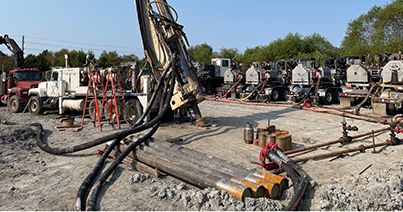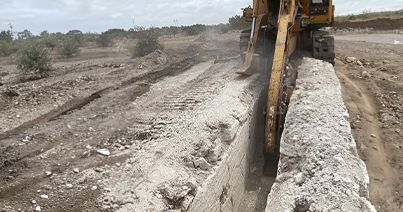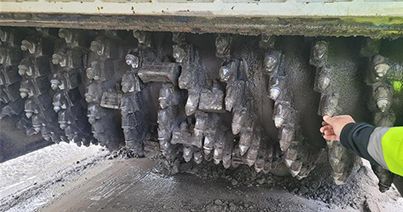
In the ever-evolving world of construction, where innovation and engineering converge, foundation drilling shapes the very groundwork on which structures rise. In this blog, we delve into the basics of foundation drilling and common types of equipment available for your operations.
What is Foundation Drilling?
Foundation drilling is a specialized technique aimed at creating deep and reliable holes in the earth using drilling rigs. These holes serve as the core for supporting a wide array of structures, including buildings, bridges, and essential infrastructures. This type of drilling can be performed by using various methods including rotary drilling, auger drilling, and core drilling, depending on the soil conditions and the specific project requirements.
The Role of Tungsten Carbide Picks (Conicals)
Rotating tungsten carbide picks are essential components for foundation drilling due to being an incredibly hard material, providing excellent wear resistance. These attributes are critical when drilling in abrasive conditions. The sharp cutting edges of tungsten carbide conicals generate less friction and heat during drilling, reducing wear on the tooling and enhancing the overall drilling performance.
Essential Tooling in Foundation Drilling
Having the right tools can make all the difference. Along with rotating tungsten carbide picks, foundation drilling relies on several tooling options.
Here are some common types of equipment:
- Augers to create deep holes in projects. They are designed with a helical screw.
- Block systems to stabilize heavy drilling equipment and machinery during foundation drilling operations.
- Buckets for excavating soil, rock, drilling, and cleaning. They are large, hinged buckets attached to the end of a crane or excavator arm.
- Core barrel-cutting tools for the extraction of soil or rock to test and analyze the soil or rock to determine various geological compositions.
- Diaphragm wall cutting tools for constructing deep and stable diaphragm walls, providing essential support for various structures and water retention systems.
- Pullers, also known as extraction tools or extractors, remove tools from the drilled holes. They are especially helpful when working with deep foundation holes or in situations where the drill bits are stuck in the ground due to challenging conditions.
- Retainers for holding drilling tools such as augers, core barrels, or casings in place during the drilling process. They prevent the tools from accidentally disengaging.
- Toolholders and shanks serve as the interface between the cutting tools and the drilling rig. These components are designed to offer secure and efficient attachment of the cutting tools, ensuring smooth and effective drilling operations. They are available in different shapes and sizes.
- Welding bars, also known as a welding auger, or a welding rod, for extending the length of drilling tools to reach greater depths during drilling operations. They can be welded to sections of augers and casings.
Each piece of foundation drilling equipment plays a role in meeting the unique challenges of construction projects. Choosing the right equipment based on the specific project requirements and soil conditions is essential for success.
Factors to Consider for Foundation Drilling
The proper execution of foundation drilling techniques ensures your construction projects can withstand the test of time and provide a solid and secure basis for a wide range of structures. Along with structural stability, you should consider these factors before drilling:
- Soil conditions can vary significantly from one construction site to another and may have soft, clay soil, while others may consist of hard rock or sand. These diverse soil conditions will indicate the types of drilling methods and tools you may want to consider --minimizing risks and potential hazards.
- Foundation drilling minimizes disturbances to the surrounding environment compared to traditional excavation methods. By drilling deep foundation holes instead of excavating large trenches, construction projects can avoid unnecessary soil removal and disruption to the natural landscape. This approach is particularly beneficial in areas with limited space and where the preservation of the environment is crucial.
- Drill deep into the ground and reach stable soil or layers of rock. By doing so, the foundation can support heavier load capacities and make it possible to construct better infrastructure.
When a well-done foundation is done correctly, it remains durable and reliable over the long term. A solid foundation can withstand the effects of natural forces, such as earthquakes, ground movements, and changes in soil moisture, without compromising the structural integrity of the building or infrastructure.
Summary
Equipping your foundation drill rigs with the right cutting system ensures efficient drilling and minimizes downtime. By understanding the unique conditions that can arise during foundation drilling, you can select the appropriate tooling to achieve successful and reliable results.
For the most up-to-date information on recent advancements, visit Kennametal’s foundation drilling page and contact an expert.
Related Articles
- Additive Manufacturing: Hydraulic Borehole Mining Case StudyLearn how a Kennametal additive manufacturing solution increased the run life of nozzles used in hydraulic borehole mining and enabled substantial savings.Learn how a Kennametal additive manufacturing solution increased the run life of nozzles used in hydraulic borehole mining and enabled substantial savings.
- Application Spotlight: Kennametal's Separation Wear Solutions Provide Longevity & Reliability in Decanter Centrifuge MachinesKennametal provides a broad portfolio of innovative, custom, and wear-resistant solutions to ensure your centrifuge operations run smoothly in all industries and applications.Kennametal provides a broad portfolio of innovative, custom, and wear-resistant solutions to ensure your centrifuge operations run smoothly in all industries and applications.
- Proven Solution: Grinding Concrete with RK4-01Bring greater productivity to the grind by requiring fewer change-outs of cutting tools on your machine Learn how with Kennametal's Road King cutting tools.Bring greater productivity to the grind by requiring fewer change-outs of cutting tools on your machine Learn how with Kennametal's Road King cutting tools.



